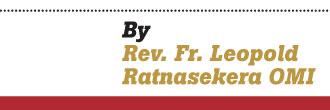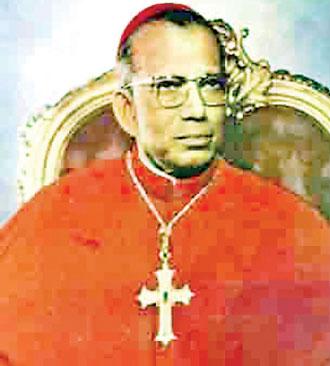Reply To:
Name - Reply Comment
 His Eminence Thomas Benjamin Cardinal Cooray OMI passed away on the 29th of October 1988. Born in 1901, he hailed from the village of Periyamulla in Negombo and came from a devout Catholic family of five siblings. Cooray’s remarkable journey began at the age of twelve when he entered St. Aloysius Seminary and later attended St. Joseph’s College, earning a B.A. London degree with subjects in Latin, English Literature, and Botany. In 1925, he joined the Oblates of Mary Immaculate congregation, taking his first vows.
His Eminence Thomas Benjamin Cardinal Cooray OMI passed away on the 29th of October 1988. Born in 1901, he hailed from the village of Periyamulla in Negombo and came from a devout Catholic family of five siblings. Cooray’s remarkable journey began at the age of twelve when he entered St. Aloysius Seminary and later attended St. Joseph’s College, earning a B.A. London degree with subjects in Latin, English Literature, and Botany. In 1925, he joined the Oblates of Mary Immaculate congregation, taking his first vows.
Impressed by his intellectual talents and deep spirituality, Cooray’s superiors sent him to Rome for further priestly and missionary formation. He excelled academically, obtaining two doctorates in Philosophy and Theology from Angelicum University. Cooray returned to Sri Lanka in 1931.
 His service encompassed various roles, including teaching at St. Joseph’s College, serving as the warden of the University Students’ hostel, and working as a professor at St. Bernard’s Seminary in Borella, where Catholic priests were trained. Cooray’s longest tenure was as the first native superior of the major seminary of the Oblates from 1937-1945. His journey took a significant turn when he succeeded the late Archbishop of Colombo, Jean-Marie Masson OMI, becoming the sixth archbishop of the Metropolitan See of Colombo.
His service encompassed various roles, including teaching at St. Joseph’s College, serving as the warden of the University Students’ hostel, and working as a professor at St. Bernard’s Seminary in Borella, where Catholic priests were trained. Cooray’s longest tenure was as the first native superior of the major seminary of the Oblates from 1937-1945. His journey took a significant turn when he succeeded the late Archbishop of Colombo, Jean-Marie Masson OMI, becoming the sixth archbishop of the Metropolitan See of Colombo.
Cooray holds the distinction of being the first native archbishop, serving from July 1947 to September 1976. In 1965, he was elevated to the status of the first Sri Lankan Cardinal by Pope St. Paul VI. Following his retirement, he lived at the “Emmaus” residence near the Basilica in Tewatte until his passing in 1988.
Throughout his life, Cooray devoted 63 years as a religious, 59 years as a priest, 42 years as a bishop, and held the title of cardinal for 23 years. His remarkable legacy left an indelible mark on the history of the archdiocese and Catholic Church in Sri Lanka. He navigated challenging times during the post-independence era, dealing with religious, cultural, and political shifts.
Cooray’s vision for Sri Lanka was one of a land celebrated for its noble civilization, ancient culture, and interfaith harmony. The Vatican’s decision to appoint a native as Archbishop Metropolitan aligned with the country’s transition from British rule to local governance.
His tenure came with numerous challenges, including the government’s takeover of denominational schools in 1960, leading to the loss of over six hundred rural schools. The refusal of visas to foreign missionaries in the mid-1960s and the imposition of taxes on those who remained affected the church’s activities.
Cooray also faced political and cultural challenges, notably the declaration of Poya days as holidays and the April 1971 youth insurrection. Despite these challenges, he remained a steady and diplomatic leader.
Cooray initiated groundbreaking efforts during his service. He was the first to invite a Pope when Paul VI visited Sri Lanka in 1970. He voted in two conclaves in 1978, becoming the first-ever Sri Lankan to do so. His involvement in the Vatican II Council, Bishops’ synods, and various Vatican congregations marked his dedication to the church’s global mission.
Cooray’s vision extended beyond Sri Lanka. He co-founded the radio station “Veritas” in Manila and played a key role in establishing the Asian Bishops’ Conference (FABC), promoting interfaith dialogue and addressing the challenges in Asia.
His impact on the archdiocese and the country was significant. Cooray laid the foundation for training indigenous clergy and supporting spiritual formation. He initiated programmes like the Daham Pasala and established centers for teacher training. He oversaw the construction of the Basilica Church of Our Lady of Lanka at Tewatte, emphasizing spirituality.
Cooray’s compassion extended to the sick, orphans, the elderly, and victims of natural disasters. His missionary work helped establish Catholic communities in Anuradhapura, eventually becoming a diocese in 1982.
Above all, Cooray was remembered for his spiritual leadership, integrity, and commitment to peace and social justice. His journey continues as he’s on the path to sainthood, potentially becoming the first-ever Sri Lankan native saint in the history of the Catholic Church.